

Hypothyroidism. Hypothyroidism (/ˌhaɪpɵˈθaɪərɔɪdɪzəm/), from hypo- ("under" in Greek) and thyroid (the thyroid gland), often called underactive thyroid, is a common endocrine disorder in which the thyroid gland does not produce enough thyroid hormone.
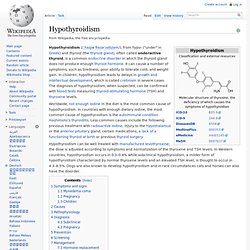
It can cause a number of symptoms, such as tiredness, poor ability to tolerate cold, and weight gain. In children, hypothyroidism leads to delays in growth and intellectual development, which is called cretinism in severe cases. The diagnosis of hypothyroidism, when suspected, can be confirmed with blood tests measuring thyroid-stimulating hormone (TSH) and thyroxine levels. Worldwide, not enough iodine in the diet is the most common cause of hypothyroidism.
In countries with enough dietary iodine, the most common cause of hypothyroidism is the autoimmune condition Hashimoto's thyroiditis. Hypothyroidism can be well treated with manufactured levothyroxine; the dose is adjusted according to symptoms and normalization of the thyroxine and TSH levels. Autoimmune thyroiditis. Autoimmune thyroiditis, or Chronic Autoimmune thyroiditis, is a disease in which the body interprets the thyroid glands and its hormone products T3, T4 and TSH as threats, therefore producing special antibodies that target the thyroid’s cells, thereby destroying it.
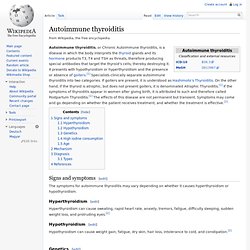
It presents with hypothyroidism or hyperthyroidism and the presence or absence of goiters.[1] Specialists clinically separate autoimmune thyroiditis into two categories. If goiters are present, it is understood as Hashimoto’s Thyroiditis. On the other hand, if the thyroid is atrophic, but does not present goiters, it is denominated Atrophic Thyroiditis.[1] If the symptoms of thyroiditis appear in women after giving birth, it is attributed to such and therefore called Postpartum Thyroiditis.[1] The effects of this disease are not permanent but transient. Symptoms may come and go depending on whether the patient receives treatment, and whether the treatment is effective.[1] Thyroid hormone resistance. Thyroid hormone resistance (sometimes Refetoff syndrome) describes a rare syndrome where the thyroid hormone levels are elevated but the thyroid stimulating hormone (TSH) level is not suppressed, or not completely suppressed as would be expected.
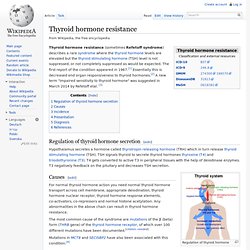
The first report of the condition appeared in 1967.[1] Essentially this is decreased end organ responsiveness to thyroid hormones.[2] A new term "impaired sensitivity to thyroid hormone" was suggested in March 2014 by Refetoff etal. [3]
Myxedematous psychosis. Myxedema psychosis, more colloquially known as myxedema madness, is a relatively uncommon consequence of hypothyroidism, such as in Hashimoto's thyroiditis or in patients who have had the thyroid surgically removed and are not taking thyroxine.
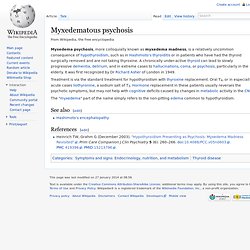
A chronically under-active thyroid can lead to slowly progressive dementia, delirium, and in extreme cases to hallucinations, coma, or psychosis, particularly in the elderly. It was first recognized by Dr Richard Asher of London in 1949. Treatment is via the standard treatment for hypothyroidism with thyroxine replacement. Oral T4, or in especially acute cases liothyronine, a sodium salt of T3. Hormone replacement in these patients usually reverses the psychotic symptoms, but may not help with cognitive deficits caused by changes in metabolic activity in the CNS. The "myxedema" part of the name simply refers to the non-pitting edema common to hypothyroidism.
See also[edit] Hashimoto's encephalopathy References[edit] Myxedema. Myxedema (British English: Myxoedema) is a term used synonymously with severe hypothyroidism.
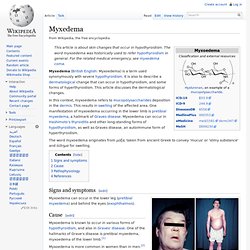
It is also to describe a dermatological change that can occur in hypothyroidism, and some forms of hyperthyroidism. This article discusses the dermatological changes. In this context, myxoedema refers to mucopolysaccharides deposition in the dermis. This results in swelling of the affected area. One manifestation of myxoedema occurring in the lower limb is pretibial myxedema, a hallmark of Graves disease. The word myxoedema originates from μύξα, taken from ancient Greek to convey 'mucus' or 'slimy substance' and ὁίδημα for swelling. Hypo- thyroidism. Hypo- parathyroidism. Signs and symptoms[edit] A number of medical emergencies can arise in people with low calcium levels.
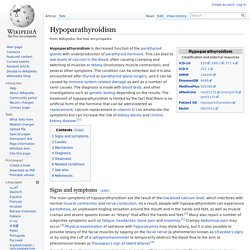
These are seizures, severe irregularities in the normal heart beat, as well as spasm of the upper part of the airways or the smaller airways known as the bronchi (both potentially causing respiratory failure).[1] Causes[edit] Hypoparathyroidism can have the following causes:[1] Mechanism[edit] Hypothyroid. Living with a Hypo- thyroid isn’t easy and 5 million Americans suffer from Hypothyroidism.

There are many side effects and frustrations that come along with this autoimmune disease. I personally have Hypothyroidism as does my Mother. I have been lucky to not have serious hypothyroid symptoms aside from weight gain and cold hands and feet but many of my clients experience significant symptoms. Hypothyroidism is a condition where the thyroid does not produce enough thyroid hormone, which is necessary to help our bodies convert beta-carotene (a nutrient found in orange and yellow fruits and vegetables) into vitamin A.
Because this conversion wasn’t happening in my body, one of my symptoms was yellow hands! Hypothyroidism Risk/Symptoms Checklist. You can use this checklist to bring to your doctor to help aid in getting a proper diagnosis of hypothyroidism, or as background information in your discussions regarding finetuning your dosage so you are at the optimal TSH level for your own level of wellness.
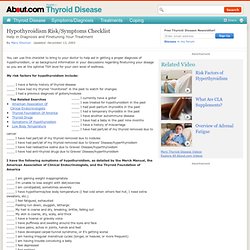
My risk factors for hypothyroidism include: